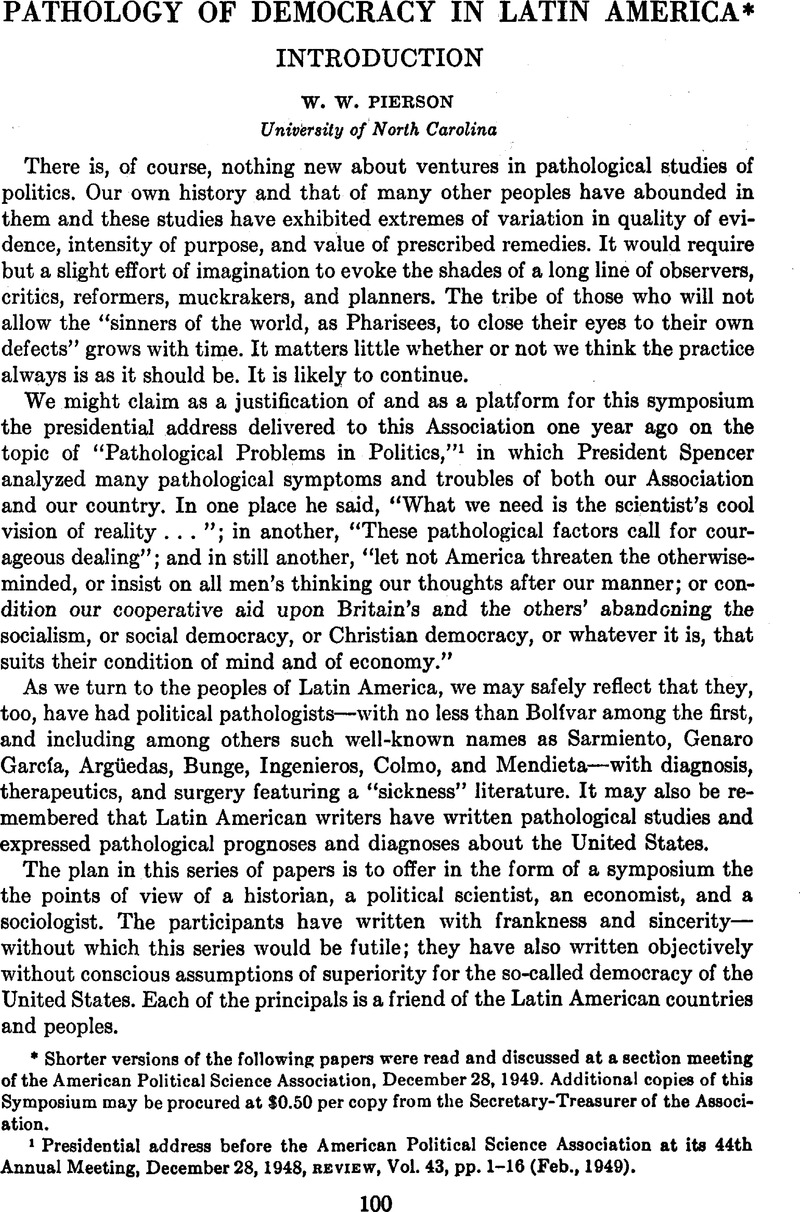No CrossRef data available.
Published online by Cambridge University Press: 02 September 2013

1 Modern Democracies (New York, 1921), Vol. 1, p. 20Google Scholar.
2 Perón, Juan Domingo, Political Course of the Future (Buenos Aires, 1948), pp. 9–10Google Scholar.
3 Juan D. Arosemena, quoted in New York Times, September 24, 1939, p. 40.
4 Latin America: Its Rise and Progress (Bernard Miall translation, New York, 1913), p. 235Google Scholar.
5 Op. cit., p. 187.
6 “The growth of a democratic spirit in Spanish America [prior to independence] had been retarded,” wrote a study group of the Royal Institute of International Affairs some years ago, “by the nature of colonial society: by the subjection of the Indians, the creation of a titled nobility, the official censorship of liberal thought, and the ecclesiastical control of education.” The Republics of South America (London, 1937), pp. 110–111Google Scholar.
7 The Spanish had a saying, “Del rey abajo ninguno,” which may be loosely translated, “No one below the king [is better than I].” Obviously, such an attitude, transmitted to the colonies and passed, in diluted form, to the independent states, would not conduce to easy acceptance of a democratic process.
8 Op. cit., p. 371.
9 Belaunde, Víctor Andrés, Bolívar and the Political Thought of the Spanish American Revolution (Baltimore, 1938), p. 177Google Scholar.
10 Ibid., pp. 177–178. Cf. also Jane, Cecil, Liberty and Despotism in Spanish America (Oxford, 1929), passimGoogle Scholar.
11 In those lower economic circles which tend to reject the unquestioning acceptance of authority, e.g., organized labor in some countries, especially under the stimulus of Communist agitators, the response to political problems and needs is frequently along “direct action” lines. This type of activity interferes with the development of democracy as we understand it.
12 Cf. José Enrique Rodó, Ariel, passim.
13 Fisher, Lillian E., The Background of the Movement for Mexican Independence (Boston, 1934), p. 15Google Scholar.
14 Cf. McBride, George M., Chile: Land and Society (New York, 1936), Ch. 1Google Scholar.
15 Cf. an unpublished manuscript study by Blanksten, George I., Some Ecuadoran Constitutional Problems, University of California (Los Angeles) Library, passimGoogle Scholar.
18 Argentina, of course, is in a questionably democratic condition in recent years, but its overall record is good.
17 Latin America: A Descriptive Survey (New York, 1941), p. 140Google Scholar. One would normally add Colombia, despite its large fraction of mestizo and Indian population, to the list of certainly democratic Latin American states but perhaps judgment as to that country's democracy should be reserved for the time being.
18 In Latin America we can add malaria and hookworm, even if we have to subtract typhus. Cf. Wilson, Charles M., Ambassadors in White (New York, 1942)Google Scholar and Stuntz, Albert E., To Make the People Strong (New York, 1948), both passimGoogle Scholar.
19 With the exception of the lawyers, who often become political hacks because of the lack of opportunity in their own profession.
20 Perón, Juan Domingo, Political and Social Situation Prior to the Revolution of 1943 (Buenos Aires, 1948), p. 10Google Scholar.
21 Perón wrote, for example, that “Circumstances … made the military … the instrument of demolition [of the regime in power in Argentina prior to June, 1943] …. But although in their proclamation of June 4 [1943] its authors only pointed out the necessity of putting an end to the corruption of the administration and of defending the authentic Argentine freedoms, the real fact is that public opinion, perhaps with very few exceptions, received the movement with warm sympathy, without worrying too much about its democratic or anti-democratic character.” Ibid., p. 12. But less in palatable disguise was the pronunciamento of an army clique, some three months before the coup, which said in part that “The first step to be taken, which shall lead us toward a strong and powerful Argentina, is to get the reins of government into our hands. A civilian will never understand the greatness of our ideal; we shall therefore have to eliminate them from the government, and give them the only mission which corresponds to them: Work and Obedience…. We shall have to arm, and continue to arm, fighting and overcoming difficulties, both internal and external…. Our government shall be a firm dictatorship, although at the beginning, in order to become firmly established, it will concede the necessary allowances.” Manifesto Distributed Among Chiefs and Officers of the Argentine Army, March 6, 1943.
22 Organization of rural workers has been largely ineffective in Mexico, the only country which has systematically tried it.
23 The All-American Front (New York, 1940), p. 201Google Scholar.
Comments
No Comments have been published for this article.